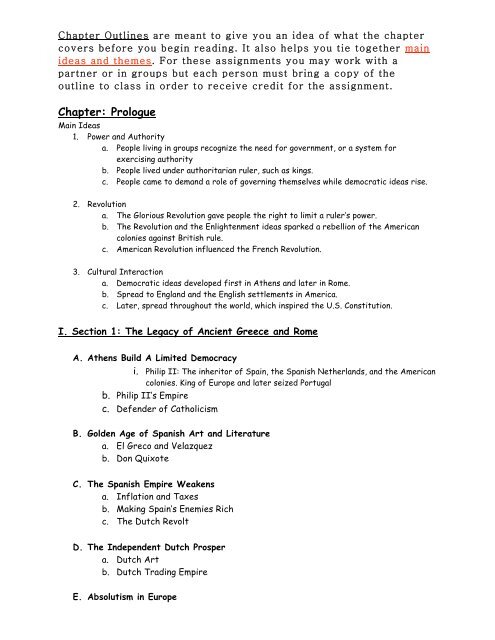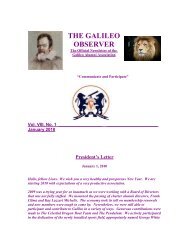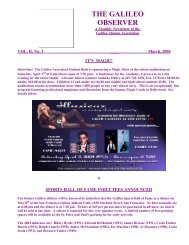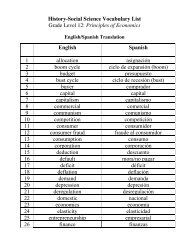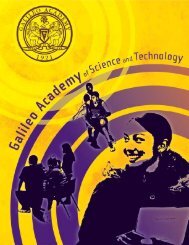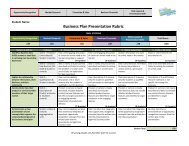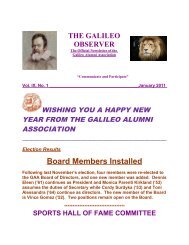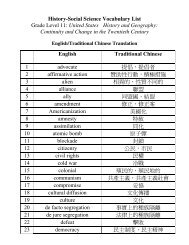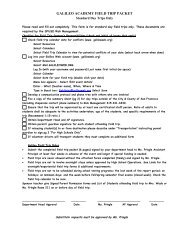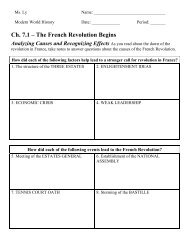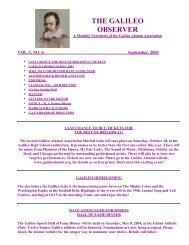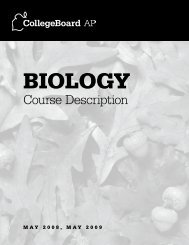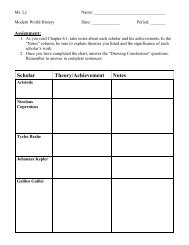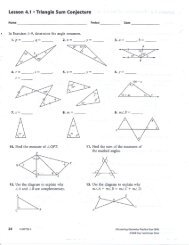Chapter Outline Sample
Chapter Outline Sample
Chapter Outline Sample
You also want an ePaper? Increase the reach of your titles
YUMPU automatically turns print PDFs into web optimized ePapers that Google loves.
<strong>Chapter</strong>: Prologue<br />
Main Ideas<br />
1. Power and Authority<br />
a. People living in groups recognize the need for government, or a system for<br />
exercising authority<br />
b. People lived under authoritarian ruler, such as kings.<br />
c. People came to demand a role of governing themselves while democratic ideas rise.<br />
2. Revolution<br />
a. The Glorious Revolution gave people the right to limit a ruler’s power.<br />
b. The Revolution and the Enlightenment ideas sparked a rebellion of the American<br />
colonies against British rule.<br />
c. American Revolution influenced the French Revolution.<br />
3. Cultural Interaction<br />
a. Democratic ideas developed first in Athens and later in Rome.<br />
b. Spread to England and the English settlements in America.<br />
c. Later, spread throughout the world, which inspired the U.S. Constitution.<br />
I. Section 1: The Legacy of Ancient Greece and Rome<br />
A. Athens Build A Limited Democracy<br />
i. Philip II: The inheritor of Spain, the Spanish Netherlands, and the American<br />
colonies. King of Europe and later seized Portugal<br />
b. Philip II’s Empire<br />
c. Defender of Catholicism<br />
B. Golden Age of Spanish Art and Literature<br />
a. El Greco and Velazquez<br />
b. Don Quixote<br />
C. The Spanish Empire Weakens<br />
a. Inflation and Taxes<br />
b. Making Spain’s Enemies Rich<br />
c. The Dutch Revolt<br />
D. The Independent Dutch Prosper<br />
a. Dutch Art<br />
b. Dutch Trading Empire<br />
E. Absolutism in Europe
a. The Theory of Absolutism<br />
i. Absolute Monarchs: kings and queens who hold all the power within their<br />
states’ boundaries.<br />
ii. Divine Right: idea that God created the monarchy and that the monarch<br />
acted as God’s representative on Earth<br />
b. Growing Power of Europe Monarchs<br />
c. Crises Lead to Absolutism<br />
~Section 2: Judeo-Christian Tradition~<br />
Judaism<br />
-Created in God’s Image<br />
Judaism: based on the teachings on the God (Yahweh). Founded by Abraham, they studied the<br />
torah and live by the teachings.<br />
-Jewish Law Teaches Morality<br />
Ten Commandments:<br />
Christianity<br />
-The Teachings of Christianity<br />
Christianity: based on the life and teachings of Jesus Christ. They believe that Jesus entered<br />
the world and dies for humanity from sin. Christians believe that they’ll reach salvation by<br />
following the teachings of Jesus Christ.<br />
-The Spread of Christianity<br />
-Rome Spreads Judeo-Christian Ideas<br />
Islam<br />
Islam: based on the teachings of the prophet Muhammad. Followers are known as Muslims,<br />
believe that God revealed teachings to Muhammad by the angel Gabriel.<br />
-The Legacy of Monotheistic Religions<br />
-Louis Weakens the Nobles’ Authority<br />
Renaissance and Reformation<br />
Roman Catholic Church: developed by Roman Christianity. Became one of the most powerful<br />
institution in Europe. Influence all aspects of life- religion, social, and political.<br />
-Renaissance Revives Classical Ideas<br />
Renaissance: the biggest cultural movement from 1300s to 1600s. Marked the “rebirth” of art<br />
and culture.<br />
-The Reformation Challenges Church Power<br />
Reformation: a religious reform movement that began in the 16 th century. Those who wanted to<br />
reform the catholic church were called protestants, since they protested against the power and<br />
abuses of the church.<br />
-Legacy of the Renaissance and Reformation
~Section 3: Democracy Develops in England~<br />
Reforms in Medieval England<br />
-Juries and Common Law<br />
Common Law: the basis of the legal systems in many English-speaking countries.<br />
-Magna Carta<br />
Magna Carta: Main source of traditional English respect for the individual rights and liberties.<br />
Due Process of Law: the right to have the law work in known, orderly ways.<br />
Parliament: the body of lawmaking in English settlements.<br />
-Model Parliament<br />
Parliament Grows Stronger<br />
-Conflict With the Monarch<br />
Divine Right: is the theory that a monarch’s power came from God.<br />
-Parliament Overthrows the King<br />
Establishment of Constitutional Monarchy<br />
-The Restoration<br />
-Glorious Revolution<br />
Glorious Revolution: Parliament had the right to limit the monarch’s power and to control<br />
succession to the throne.<br />
Constitutional Monarchy: the powers of the rulers are restricted by the constitution and the<br />
laws of the country.<br />
-English Bill of Rights<br />
Bill of Rights: list of the rights and freedoms of the individual<br />
-England’s Legacy
~Section 4: The Enlightenment and Democratic Revolutions~<br />
Enlightenment Thinkers and Ideas<br />
Enlightenment: an intellectual movement that many enlightenment thinkers tried to apply the<br />
principles of reason and the methods of science to all aspects of society<br />
-Hobbes and Locke<br />
Social Contract: the agreement between citizens and the government.<br />
Natural Rights: an individual’s born rights.<br />
-Voltaire and Rousseau<br />
-Montesquieu<br />
Separation of Powers: government divided into three separate branches: legislative, executive,<br />
and courts to interpret them.<br />
The Beginnings of Democracy in America<br />
-Americans Protest British Policies<br />
-Americans Win Independence<br />
-Enlightenment Ideas Shape the Constitution<br />
Representative Government: all citizens elect representatives to make laws and policies for<br />
them.<br />
Federal System: government separated between the federal or central governments.<br />
The French Revolution<br />
-Causes of the Revolution<br />
-Early Reforms of the Revolution<br />
-Democratic Reforms Undone<br />
<br />
The Struggle for Democracy Continues<br />
-The United Nations Promotes Democracy<br />
United Nations:<br />
-New Movements Towards Democracy


